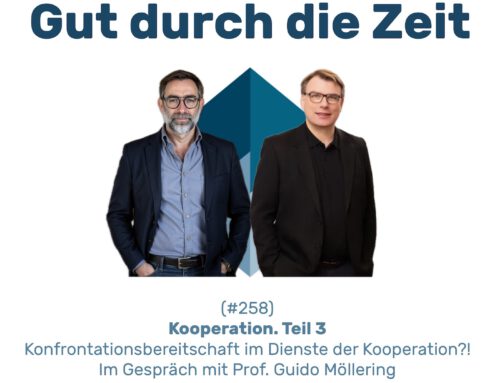INKOVEMA Podcast „Well through time“
#22 – Balling's cultural diagnosis of organisations in the face of agile working methods.
In conversation with Rolf Balling
Well through time. The podcast about mediation, conflict coaching and organisational consulting.
Rolf Balling, organisational consultant and transactional analyst, explains his model for diagnosing the culture of organisations and how it can be used in the work of managers, consultants and mediators. The model will be concretised using an example of the implementation of agile working methods. Together with Sascha Weigel, the question of why we should look for „intelligent wobbling“ in organisations will also be explored.
Contents:
- Making organisations (mentally) comprehensible
- Action-orientated communication analysis, e.g. with the help of depth psychological concepts of transactional analysis E. Berne
- System-theoretical analysis of the systems involved, which are each other's environments, e.g. according to the system-environment theory of N. Luhmann
- Cultural sociological analysis of practices and codes, e.g. according to A. Reckwitz
A fool with a tool is still a fool.
- Balling's cultural diagnosis of organisations
- Three valences (regularity, commitment, freedom) are the foundation
- Based on transaction-analytical personality concepts (machine=regularity, family=commitment, playground=freedom)
- Examples in organisations: Regularity based on Toyota's efficiency improvements in the 1990s; commitment based on continuous improvement proposals; freedom in start-ups and their further development
- Application of the concept to change requirements at a (typical) medium-sized company that now wants to experiment with the help of prototypes instead of conducting classic market research and analyses in order to introduce new products.
- Possible applications of the model by managers, counsellors or mediators
- implicit or explicit?
- Analysis tool or conversation opener?
- Thinking or communication film?
literature discussed:
- Balling, R.: Diagnosis of organisations, ZTA 4/2005, 234 ff.
Left:
- Rolf Balling's website: https://www.rolf-balling.de/





Leave A Comment